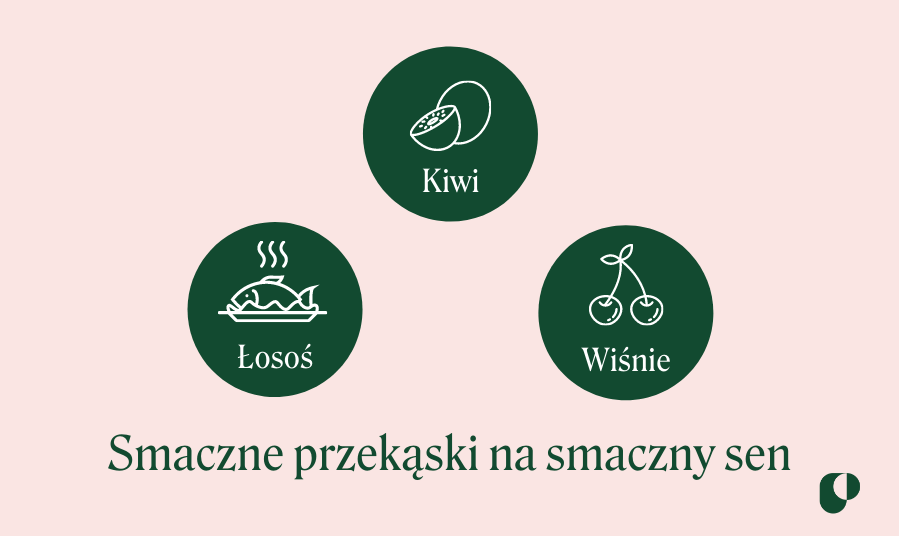Diet for a good night's sleep

Plantulas profess the motto Fri. "Sleep is the most important thing, and a good night's sleep is a good life." And as for a good life, many components are combined - the same is true with sleep.
We know for a long time that our diet affects the quality of sleep and rest. Most people are well aware that you shouldn't drink coffee in the late afternoon, the perfect dinner is a light meal, and snacking at night is not the best idea. Is there a "diet for a good night's sleep"?
 With the help of clinical nutritionist Paulina Ihnatowicz and publications provided byPubMed , we have prepared a few rules that are worth following in order to live a long and happy life and sleep sweetly and deeply.
With the help of clinical nutritionist Paulina Ihnatowicz and publications provided byPubMed , we have prepared a few rules that are worth following in order to live a long and happy life and sleep sweetly and deeply.
Our conversation with Paulina about diet is available here:
At the beginning, we want to emphasize one very important rule: our diet is fully individual and each of us can benefit from different things, but there are some generalities.

The right amount of calories
Sleep is influenced not only by dinner, but by the whole day's diet. As everywhere - we strive for the golden mean and common sense. When we eat too many or too few calories - we rest worse, shorter, and the body does not fully regenerate. So it's worth calculating the estimated caloric demand or just listen to your intuition - don't overeat, but don't starve either. Interestingly, most of us tend to overeat! So if we don't feel well - our diet needs to be improved.
Macronutrients
Again, we want to emphasize the importance of maintaining harmony. Too little or too much carbohydrates and fats interfere with sleep. It is similar with protein - too little amount extends the moment from going to bed to the first phase of REM sleep, and too much makes us wake up at night and get up sleepy.
The Mediterranean diet is recommended for a good night's sleep
The Mediterranean diet is one of the healthiest diets - anti-inflammatory, nutritious and rich in antioxidants. What's so special about our friends from the south?

- Nuts - Daily consumption of about a handful of nuts will improve our sleep. This is due to melatonin, the sleep hormone they contain.
- Fish - They are a source of complete and easily digestible protein. They should appear on our menu about 2-3 times a week.
- Colorful vegetables and fruits - The golden rule of a healthy life. It is advisable to include in the diet blueberries, strawberries or raspberries - a source of antioxidants and fiber with a small amount of sugar.
- Whole grain cereals - Their magical power is anti-inflammatory. Carbohydrates are important in the Mediterranean diet, so replace white rice with brown, replace pasta with wholegrain and start eating buckwheat.
- Healthy fats - In addition to fish and seafood, add a handful of seeds to your meal, fry something in olive oil or pour semolina with linseed or black cumin oil.
- Protein - especially vegetable. Meat and dairy products are allowed in the diet, but tofu or chickpeas are especially good for a good night's sleep.
Tasty snacks for a good night's sleep
- Kiwi - Eating two kiwis a day can noticeably improve your sleep in just two days! According to research, people who ate kiwi in the evening fell asleep faster and the quality of their sleep was much better. The reasons are not yet clear.
- Cherries or cherry juice - In addition to being very healthy, cherries naturally contain melatonin and antioxidants. There are known studies in which it was found that people who drank two cups of cherry juice a day had more efficient and longer sleep.
- Salmon - Although we have already mentioned fatty fish, we return to the topic a bit. Studies have shown that people who ate salmon three times a week slept better and functioned better during the day. This is probably due to the vitamin D and omega-3 fatty acids it contains.
What should dinner look like?

First of all - it should be eaten about 2-3 hours before bedtime. An easily digestible meal will certainly do us good - most calories should be taken in the first half of the day. Let's skip the excess fats - those eaten in the evening will have a bad effect on our rest - just like hot spices.
The ideal meal consists of carbohydrates and contains some protein. Prepare a vegetable cream soup and add some tofu, legumes or a piece of fish. Also try whole wheat pasta with non-greasy pesto or oatmeal with fruit. Optionally, you can add a little fat to dinner in the form of olive oil or peanut butter.
The break between the last meal before bedtime and the first one after waking up should last at least 10h. If it extends to 14h - ideally, a 12-14h break is a goal we can strive for.
If our sleep is of low quality — we sleep for a short time, waking up often, it is worth starting to look for the cause. Very often it is an unhealthy and poorly balanced diet. Increasingly, it is said that the obesity epidemic we are currently struggling with is partly the result of less and less sleep.
Do you feel good, the rules from the article are close to you, and your diet is varied? We applaud thunderously and wish you sweet dreams.
If you want to improve the quality of your sleep - join the #BoSenJestWażny challenge - for 7 days you will receive from us a practice plan and knowledge to work on your sleep quality on your own!
SOURCES WE USED:
Interview with Paulina Ihnatowicz - Diet for better sleep: CLICK
Meng, X., Li, Y., Li, S., Zhou, Y., Gan, R.Y., Xu, D.P., & Li, H.B. (2017). Dietary Sources and Bioactivities of Melatonin. Nutrients CLICK
Richardson, D.P., Ansell, J., & Drummond, L.N. (2018). The nutritional and health attributes of kiwifruit: a review. European journal of nutrition CLICK
Lin HH, Tsai PS, Fang SC, Liu JF. Effect of kiwifruit consumption on sleep quality in adults with sleep problems. Asia Pac J Clin Nutr. 2011 CLICK
Losso, J.N., Finley, J.W., Karki, N., Liu, A.G., Prudente, A., Tipton, R., Yu, Y., & Greenway, F.L. (2018). Pilot Study of the Tart Cherry Juice for the Treatment of Insomnia and Investigation of Mechanisms. American journal of therapeutics CLICK
Hansen, A. L., Dahl, L., Olson, G., Thornton, D., Graff, I. E., Frøyland, L., Thayer, J. F., & Pallesen, S. (2014). Fish consumption, sleep, daily functioning, and heart rate variability. Journal of clinical sleep medicine: JCSM: official publication of the American Academy of Sleep Medicine, CLICK
0 comments




